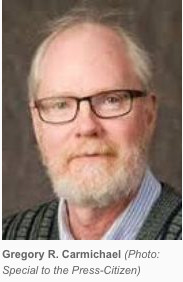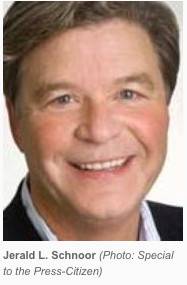
The intent of these two organizations was broadly similar: the IPCC was to report on climate change at the global level, while CGRER was to perform research on this and related topics at the state and regional scale. There was widespread recognition of global warming as an important emerging problem, and consensus that more research was needed to understand it and the human contribution to it.
Record heat and drought had plagued the planet two years earlier when the IPCC was formed. Citizens were quite interested in climate change and its causation. In the spring of 1990, Iowa’s Gov. Terry Branstad, then also president of the National Governor’s Association, asked the two of us to brief him on climate change and on policies governors might adopt to address this emerging problem. We saw it as our duty and a rare opportunity.
Meanwhile, three state legislators — Paul Johnson, Ralph Rosenberg and David Osterberg — shepherded the Iowa Energy Efficiency Act through the General Assembly, thus creating CGRER, and the Board of Regents approved.
Clearly there was a need for outstanding research to be conducted on climate change, but we also understood climate affected many other issues including ecosystems, water, human health, culture and social systems. So CGRER’s focus from the beginning encompassed both climate change and broader environmental issues.

In addition, CGRER has focused attention on how global climate change impacts are expressed at regional scales, demonstrating, for example, that Iowa and the Midwest are vulnerable to extreme weather events like the floods of 1993 and 2008. As the key role of humans in climate change became established the dialogue shifted to what mitigation and adaptation actions should be taken.
In early 1994, CGRER organized the symposium "Preparing for Global Change: A Midwest Perspective," bringing together leading scientists and policy makers. CGRER members helped the state assess impacts and develop strategies for responding to global climate change through technological innovation. CGRER’s members were instrumental in the Iowa Climate Change Advisory Council and the Iowa Climate Change Impacts Committee of 2010.
Today there is a growing sense of urgency to severely reduce emissions and transition away from the fossil fuel age, and the time to act is now. Through our research and outreach through our website, podcasts, "Iowa Environmental Focus," and annual statements by Iowa Climate Science Educators, we are actively helping inform the public about environmental change at the regional scale, and provide information to help decision makers craft effective policies moving forward.
CGRER will continue to conduct research on the causes, consequences and cures for climate change and related environmental effects. Our mission at the regional scale is more important than ever – not only because climate change constitutes a potent threat to our future, but also because it represents an incredible opportunity for creating a better environment and new economy with high-quality jobs in wind and solar power, energy efficiency and infrastructure renewal.
We invite you to join us for the WorldCanvass discussion of “The Evolution of Climate Change: 25 Years and Counting” on Oct. 13, from 5 to 6:30 p.m., at FilmScene in Iowa City. Also participating in the conversation will be U.S. Congressman Dave Loebsack, Iowa State Senator Joe Bolkcom, David Osterberg from the UI College of Public Health, and solar energy entrepreneur Tim Dwight.
Gregory R. Carmichael and Jerald L. Schnoor are co-directors of Iowa’s Center for Global and Regional Environmental Research.